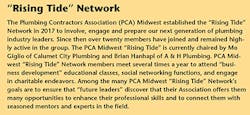And the skilled labor shortage continues.
Regular readers of CONTRACTOR Magazine are already familiar with the story. On one side of the equation, skilled labor is aging out of the construction industry at an increasing rate, with plumbers a good bit “grayer” than their counterparts in other trades.
According to datausa.i, the average age of a plumber, pipefitter or steamfitter in the US is 40+, with experienced tradesmen a good bit older than that (the average age of a master plumber in Texas, for example, is 58 years old. A good many plumbers are in the Baby Boomer demographic (born between 1946 and 1964), and roughly 10,000 Baby Boomers retire every day.
And speaking of retirement, a kind of forced retirement has only served to exacerbate the problem. Apparently, back when the Great Recession hit in 2008, a great many skilled tradespeople threw up their hands, left the workforce and simply never came back. There’s just this big hole in the numbers where those bodies should be.
Kids These Days
Now let’s look to the other side of the equation: young people entering the trades. The latest numbers from the Bureau of Labor Statistics predicts that between 2016 and 2026 the profession is expected to grow by 16 percent. But more accurately, that’s how much the number of plumbers, pipefitters and steamfitters in the US needs to grow in order to keep up with the projected amount of work (particularly in new construction).
Unfortunately, all the anecdotal evidence says that those young people are just not coming in the door. Every contractor you talk to has staffing problems. The union halls are empty. Large mechanicals keep technicians on the payroll in winter when there’s practically no work, just so they’ll be around come summertime.
So why aren’t more young people choosing plumbing as a career? I haven’t been able to find any surveys on the topic that directly asked 18- to 24-year-olds (and really, it’s hard to imagine Millennials filling out such a survey), but speculation within the industry and among economists is rampant. Such speculation includes: young people have been brainwashed into thinking that only a four-year degree is the guaranteed path to financial security; young people think “real work” means typing away at a computer; young people don’t want to work with their hands; young people don’t want to get dirty.
And there are some speculations—generalizations—that are far less charitable: young people won’t show up on time; young people don’t know how to present themselves professionally; young people lack the work ethic the trades demand; young people can’t pass a drug test.
How much of this is perception and how much is reality? I think the emphasis on the four-year degree—particularly to the detriment of shop and vocational classes at the high school level—has certainly played a role. And the new digital age, the digital nature of so much of the modern workplace, has definitely had an effect. But every time I hear some variation on the “kids these days” complaint, it always brings to mind this quote:
“The children now love luxury; they have bad manners, contempt for authority; they show disrespect for elders and love chatter in place of exercise.”
It’s from Socrates, and it dates back more than 2,400 years. Tension between the generations seems to be an unchanging fact of human nature. Older people seem always, almost reflexively, at least a little bit disappointed in the young. Maybe it’s a defense mechanism? After all, they are here to replace us…
Flip the Script
Instead of talking to young people about why they didn’t choose a career in the plumbing trades, I chose to talk to three young men who did. They are working at different roles in different organizations, but they all have one thing in common: they are all the sons and grandsons of plumbers.
Which comes as no surprise; the trades are famously multi-generational. But think: these young people grew up with laptops and smartphones. They grew up with all the same representations of plumbers in the media. They went to High School and to college with other young people who talked about being doctors or football stars or computer programmers. And still, they chose a career in the plumbing trade. And why? Because they knew it. It was familiar to them. They could see what the work was like, what the advantages of it were like, and the kind of lifestyle it could support.
It won’t fix the workforce shortage overnight, but maybe if more people already in the plumbing trade could share the actual, lived experience of their work, it could help change young people’s perceptions. (Well, either that, or plumbers could start having lots more kids!)
Chris Kandefer, Foreman with John W. Danforth – 29 years old
John W. Danforth is a full-service, design-build mechanical contractor with facilities in Buffalo, Rochester, Syracuse and Albany, NY. Founded in 1884, the company is ranked at #28 in CONTRACTOR’s 2019 Book of Giants.
My grandfather was a plumber way back in the day. He had six children. His sons all became plumbers also. He started his own business, he passed it on down to his sons, and I was drawn into being a plumber. It was in my blood, there was no way around it. It all started, well, my dad makes the joke that most kids when they were younger they would get Lincoln Logs as toys, and he would give me PVC fittings instead. So he wanted me to be a plumber.
Right after high school I did some preliminary heating and air conditioning work, so I went to ECC Community College to further my education in AC. I have a universal certification for refrigeration. And over time I acquired other certifications, such as my welding cert. And during the seven years between graduation in 2007 and when I was accepted into the union program in 2014, that’s what I was doing, I was doing non-union work. What led me to Danforth was the union side of it.
I guess it’s just my mentality [that got me to the foreman position]. I always strived, when I was a first-year apprentice, I always wanted to know more information. How does the system work? Why are we doing things a certain way? Those questions stuck with me all through my time as an apprentice, and it led me to pretty much training myself—along with other people training me—to be a foreman.
I love it. I can’t see myself doing anything else. Just to see a building, from the ground, as nothing, just an abandoned lot sometimes, to see it grow to become a skyscraper. And then to drive by that building every day, to see people seeing it, it just gives me so much pleasure, to know that I helped build something that people could be proud of. I feel great.
I would say [to young people thinking about the trades], don’t be afraid of doing hands-on work. It’s nothing like being in a cubicle. It’s exhilarating work with high energy. And I think if a lot more people took it in as, instead of hard work and not a lot of people want to do it, I think more people would do it, just to give it a chance, see what it’s like.
I think a lot of times plumbing gets put down. You say plumbing and people think of a 300 lb. guy leaning over your toilet trying to change it and plumbing isn’t that. It’s installing the new piping that’s essentially running an entire building; flushing a toilet, running a sink, the drinking fountains. There’s so much more behind it that people don’t know. I think once more information is brought out there, I think the profession would be a higher commodity.
I’m almost at that point in my career where I could go almost any route, and I haven’t found anything—besides being a foreman—because, maybe, nothing else has struck my interest. Maybe it’s because I’m so young and haven’t really seen everything yet.
Moe Giglio, Operations Manager with Calumet City Plumbing Co. – 25 years old
Calumet City Plumbing, headquartered in Calumet City, IL, started out doing residential service in 1967. Since then the company has branched out into commercial, industrial and municipal emergency service and repair.
[Calumet City Plumbing has] grown to doing municipal-wide water meter changeout projects. When the water meters in a town are no longer reading accurately, and a lot of the town has moved to estimated billings because they can no longer get accurate readings, then they [have to] change out all the water meters. Every home, every business, every meter in town. We will go into town and change out all the meters. We’ve done projects as small as a couple hundred all the way up to 12,000-13,000 meters.
[I got into the business by] being around it. My father was a plumber, still is a plumber. My grandfather as well. But the ability to work with your mind through your hands, I think is exciting. And a lot of people forget about that. Everybody wants the corner office, but nobody remembers how to build it. The inner workings and behind-the-scenes aspects of a lot of what we see is interesting to me.
[During my] apprenticeship program I got a healthy mix of a lot of different aspects of plumbing. Service and repair, new construction, outside underground, site utility work, sewer and water. [I discovered] that in more populated areas, most people in the trades stick to one aspect of the trade. If you’re a new construction plumber, you pretty much do new construction. If you’re a guy that does site utility work, new houses, sewer and water, you pretty much stick to that. I’ve been fortunate enough to meet and work with guys from a little further south, and plumbing means many things down there. It’s refrigeration work, it’s plumbing and pipefitting, it entails much more than it does closer to a heavily populated area. The balance between [being a specialist and being a generalist] was interesting to me.
Currently, my time is split between the office and the field. The people I work with have been more than generous with their time in letting me shadow them. The best advice I’ve gotten from everybody is to be a sponge. To absorb, stay late, ask questions, to listen… There’s a thousand different ways to do it. To do anything. If you give six different plumbers the same task they’re going to come up with six different ways to do it.
Often times, 95 percent of the work that somebody does is going to get covered by ground or a wall and that can be frustrating for a lot of people. Especially a lot of younger people in today’s social media environment, where you want to showcase a lot of what you do. And it can be frustrating for a lot of people that only a small percentage of your efforts, the fruits of your labor, can be demonstrated to the rest of the world.
[My advice to people who would like to pursue a career in the trades?] Basic math. Asking questions. And listening. No job is below you. There’s a reason for everything. Make a job out of everything.
Brian Hanhapl, Assistant Project Manager with A&H Plumbing & Heating Co. – 25 years old
A&H Plumbing & Heating Co. is headquartered in Elk Grove Village, IL. Family-owned and operated for the past 23 years, they perform residential and commercial installation, service and repair.
When I first started, growing up, my father exposed me to it pretty early. He had me help around the house doing different stuff. Then through high school and college, I worked in our shop a couple years. I went out with our driver, going out to the field, making deliveries. I also worked at a plumbing supply house. That helped expose me a little bit more. There was a manufacturers rep nearby. I learned a lot about the products—fittings and all that—that the guys in the field were ordering and using every day.
Then I just got more and more exposure once I started full-time with the company, working my way up. I started here as a project administrator—I took over the responsibilities of someone we had who retired. He dealt with a lot of the paperwork on the projects. So, I’ve handled that and progressed from there to a project manager, started handling some of the projects myself.
Going in, I knew that I wanted to work in the office. I guess my expectation was that I would one day take over the business. It’s kind of been my goal since a young age... It’s still kind of what I strive for. So far everything has been smooth. I don’t have any problems working with or alongside my dad.
So that’s the plan. In maybe ten years or so, once I’ve got a little more experience, we’ll start the transition, and hopefully I’ll be ready to take it over at that point. We’ve talked about it. I’ll keep taking on more and more responsibility, take on more of what he does, and soon I’ll start taking that off of him so that he’ll eventually be able to retire.
For anyone young, we need more people to go into [the plumbing trade]. Especially recently. The plumbing [union] hall has been empty during the summers, and they’re always looking for more people to join. It’s a great career if you can’t sit at a desk, if you like working with your hands. The union provides great benefits. You don’t have to go to college and build up all that debt. You can start working from day one. You can make really good money with it. It’s a great industry. And I think the best part is you get to see what you build.
You can drive around the city and be proud of what you built, you and your company. Like, I built that – I saw that whole building go up!
Links to Share
If you know any young people—or, in fact, people of any age—who are looking for a career that lets them work with their hands, offers good pay from day one, and has almost unlimited opportunities for advancement and personal development, here are a few links to share:
SkillsUSA https://www.skillsusa.org/
SkillsUSA is a partnership of students, teachers and industry working together to ensure America has a skilled workforce. Skills USA provides educational programs, events and competitions that support career and technical education (CTE) in the nation’s classrooms.
Association for Career & Technical Education (ACTE) https://www.acteonline.org/
ACTE’s mission is to provide educational leadership in developing a competitive workforce by empowering educators to deliver high quality CTE programs that ensure all students are positioned for career success
Technology Student Association (TSA) https://tsaweb.org/
The Technology Student Association (TSA) enhances personal development, leadership, and career opportunities in science, technology, engineering, and math (STEM), where members apply and integrate these concepts through intracurricular activities, competitions, and related programs.
National Career Pathways Network (NCPN) http://www.ncpn.info/
The National Career Pathways Network (NCPN) is a membership organization dedicated to the advancement of Career Pathways, career technical education (CTE), and workforce development initiatives. NCPN’s membership encompasses secondary and postsecondary education, adult education, workforce development, economic development, workforce investment boards, correctional education, community-based organizations, and employers.
American Technical Education Association ( postsecondary ) (ATEA) https://ateaonline.org/
ATEA is a premier association for the post -econdary technical educator, with emphasis on professional development.
About the Author
Steve Spaulding
Editor-in-Chief - CONTRACTOR
Steve Spaulding is Editor-in-Chief for CONTRACTOR Magazine. He has been with the magazine since 1996, and has contributed to Radiant Living, NATE Magazine, and other Endeavor Media properties.




